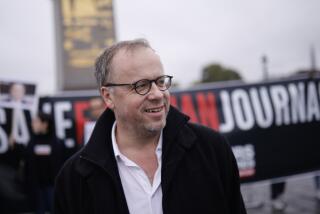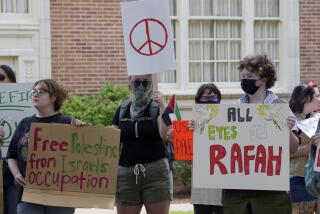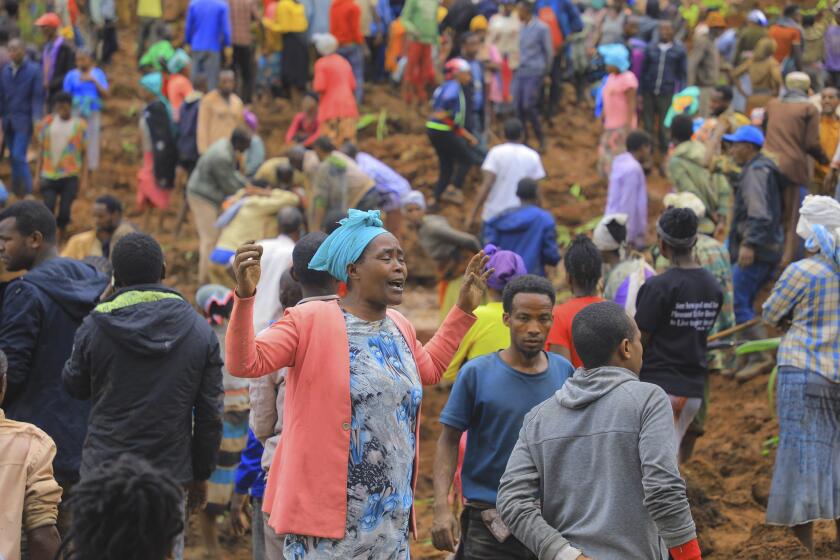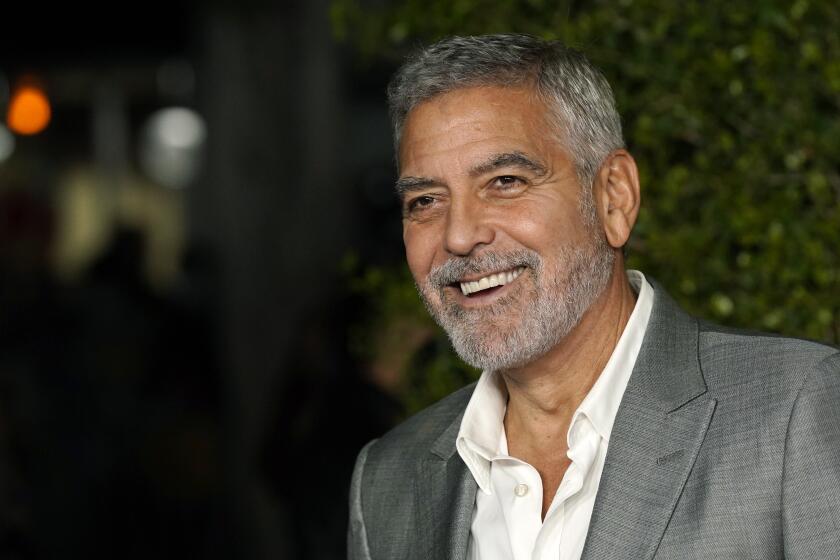Syria’s rocky road to a free press
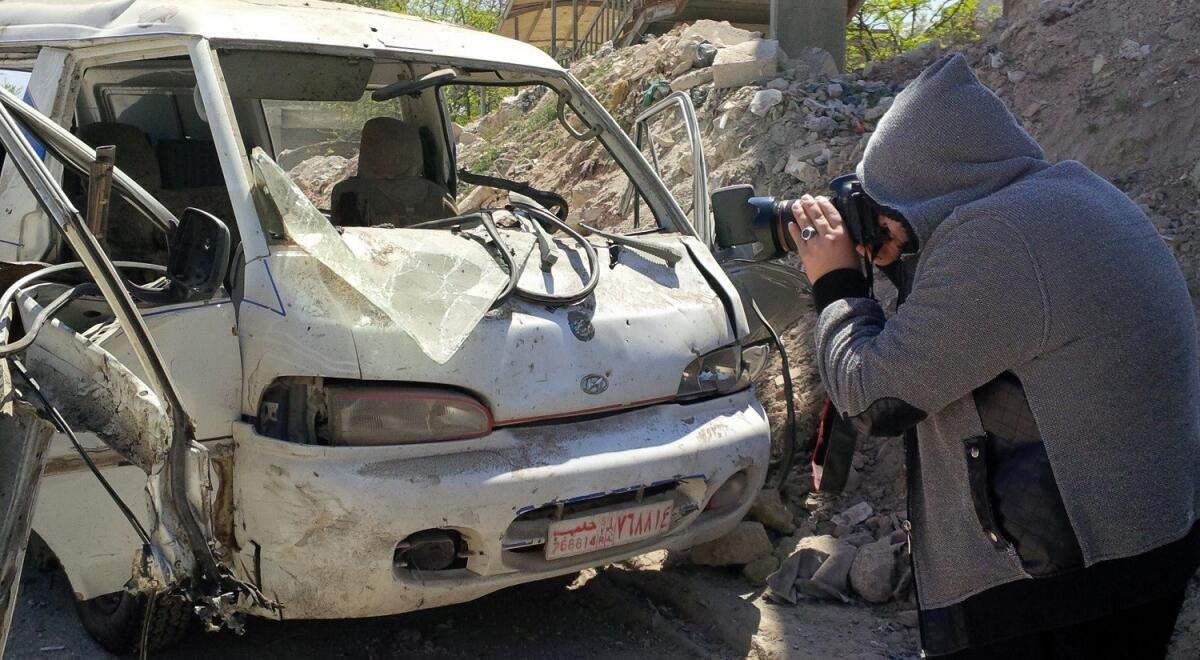
Laith Halabi paced the dark streets of Aleppo looking for a person to interview.
The wiry young journalist with the independent Shahba Press news agency worried that no one would agree to a man-on-the-street, even on the innocuous topic of a neighborhood generator.
After being turned down by one man who feared Syrian government retribution, he found another — with long, slicked-back hair and skinny jeans — who agreed to speak.
But as Halabi readied his tripod, a neighborhood resident mentioned that the man was a rebel fighter. Halabi turned off his camera, saying, “He has to be a civilian.”
“So just say he’s a civilian; he’s not wearing a military uniform,” the resident said.
“No, we want to present an accurate picture,” he replied.
As he packed up and walked away, Halabi, who was wearing a rubber bracelet in the tricolors of the Syrian opposition, said, “We didn’t come out to spread lies.”
::
Like many young Syrians, Halabi, 20, began his foray into journalism in 2011, recording short clips of early antigovernment protests on his cellphone and posting them online. He was a high school senior, but he dropped out when the opposition fought back against the government’s crackdown.
Activists who worked from within the nascent rebel groups provided the voice of the opposition narrative, with the hope that the stream of information from areas foreign journalists couldn’t reach would lead to international outrage and intervention.
Three years later, Halabi and others have progressed from activists to citizen journalists to full-time reporters, albeit with a lingering viewpoint.
In a country where objective journalism has never been allowed, opposition-bred journalists say they are creating free and independent Syrian news media. But they face a slew of challenges, including inadequate funding and the difficulty of shaking their own biases. They also face threats of kidnapping and execution from some of the same rebel groups they once worked alongside.
“Whatever I see I will report, even if the Free Syrian Army makes mistakes, we will report it,” Halabi said. He was sitting in a Shahba Press office, whose walls remain festooned with banners for two prominent Islamist rebel groups, Al Tawheed Brigade and the Islamic Front. “We try as much as possible not to lean toward any political or military side. This is free media.”
Syrians who have formed news agencies do worry about abandoning their pro-opposition position, said Armand Hurault, spokesman for the Assn. for the Support of Free Media.
But “it’s this model which is the foundation for free Syrian media,” Hurault said. “I think it’s a long way off, but it’s getting there.”
The Aleppo Media Union, which launched late last year and boasts members from each of the city’s news agencies, is considering an honor code to promote objectivity and professionalism, words frequently bandied among opposition journalists these days, though what they actually mean can vary.
“We are not neutral but we are objective,” said Mamoun Khateeb, manager of Shahba Press, which operates a quasi-wire service. “We still say the revolution comes first, which means we are not neutral.”
Questions of objectivity often involve politically or religiously loaded words, foremost among them shaheed, “martyr,” used in references to rebels or civilians killed by pro-government forces. Though Shahba Press still uses the word, Khateeb says it draws the line elsewhere.
“We don’t say ‘the regime’s dogs’ like some websites say,” said Khateeb, who worked in community relations at the city hall in the northern town of Marea before the uprising. “We try as much as possible to have our news acceptable to all sides.”
Another organization, SMART News, regularly finds itself defending the use of the word qateel, “victim,” and accused of being “against the revolution,” said manager Muhammad Malaak. Malaak has resorted to pulling examples from the Koran to prove to his journalists that the word qateel is also found in Islamic scripture.
“If you are too emotional you are going to lose your message,” he said. “You have to be balanced and professional.”
News organizations also contract with international news agencies to earn money and distribute news. Such arrangements have helped catalyze the shift to more professional conduct.
But the move toward independent media has had financial costs as the organizations no longer have access to the money flowing to rebel groups. And few organizations or individuals provide funding for independent news media in Syria.
At its height last year, Shahba Press had 70 correspondents in 30 offices across four provinces. But when it was deemed insufficiently secular by an opposition non-government group that was channeling money from Western countries, financial support dried up. Now the agency has scaled back to just six offices in Aleppo province with 15 journalists. Wages are intermittent.
To survive, Shahba has sold most of its laptops and Internet equipment. Halabi said he must go to friends or neighborhood rebel groups to access the Internet and send out news reports.
At the agency’s cramped one-room headquarters in Marea, there are mismatched chairs and mildew on the walls. A kitchenette is located under a staircase. Desks that look as if they had been acquired from a 1990s computer lab are arranged haphazardly and leave little space to stand.
“We are going to try as much as possible to keep going,” said Khateeb, whose wife is expecting their first child. “Even if we have to begin selling our possessions.”
::
On the fifth floor of an Aleppo apartment building, the unmarked door to a neighborhood Shahba Press office swings open with a shove. Two days earlier, the office had been ransacked, robbed and burned.
No group has claimed responsibility for the attack, which garnered little attention. Since the beginning of 2013, when opposition journalists began reporting on crimes committed by rebel groups, threats, kidnappings and killings have occurred frequently.
The Aleppo Media Union held its first meeting in November a week after a well-known citizen journalist, Mohammad Saeed, was killed by unidentified gunmen. Days later, union co-founder Abdulwahab Almullah was kidnapped. He remains missing.
The union had hoped that by uniting all citizen media groups in Aleppo it could offer a degree of protection, said Yusuf Siddeq, a journalist with the Aleppo Media Center, another quasi-wire service.
Last year, the extremist Islamic State of Iraq and Syria led an organized campaign against journalists associated with other rebel groups in northern Syria. When the Aleppo children’s hospital was recaptured from ISIS, dozens of prisoners and the bodies of executed detainees were discovered.
Though ISIS has been pushed out of many opposition-controlled parts of Syria, journalists still face deadly risks.
Even Shahba Press, which essentially evolved from a media arm of Al Tawheed Brigade and retains one of its members on its board of directors, hasn’t been spared. When the agency reported on a commander who was stealing from civilians, he threatened to retaliate against the agency if it didn’t take the report off the website.
Khateeb still doesn’t know who attacked the Shahba office. But he doubts it was ISIS. It wasn’t in keeping with their method of operation.
“They would have blown it up,” he said.
More to Read
Sign up for Essential California
The most important California stories and recommendations in your inbox every morning.
You may occasionally receive promotional content from the Los Angeles Times.
